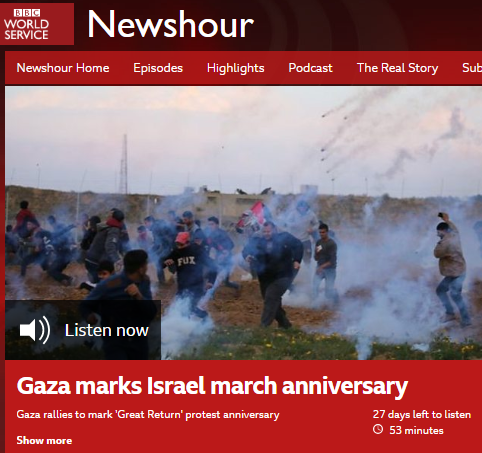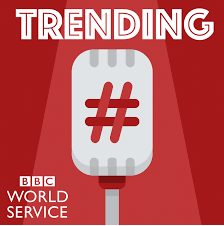As we saw in an earlier post, the March 30th afternoon edition of the BBC World Service radio programme ‘Newshour’ was titled “Gaza marks Israel march anniversary” and following reports from BBC Jerusalem bureau correspondents in the Gaza Strip and southern Israel, listeners heard five full minutes of unchallenged pro-Hamas propaganda from a professor at a university established by Hamas leaders.
Later on in the same programme (from 44:06 here) presenter Lyse Doucet recycled part of that interview. [emphasis in italics in the original, emphasis in bold added]
Doucet: “A reminder of our top story this hour: thousands of Palestinians have been demonstrating on the border of Gaza on the first anniversary of weekly protests against Israel. Dr Mosheer Amer is professor of the Islamic…at the Islamic University of Gaza. He told this programme why his students were so frustrated with life there.”
Amer: “…there’s a very strong sense of despair because you know there is a high unemployment rate – so over like 60% among the Gaza population – so you can’t expect a student to study 4 years and then he or she ends in, you know, not working. What am I studying for? There is no goal. I mean what kind of job I’m going to find. There is no prospect for a better future in Gaza.”
Given the BBC’s obligation to provide “impartial news and information to help people understand and engage with the world around them”, listeners may have expected that “top story” to go on to include the perspective of residents of the Israeli communities near the border with the Gaza Strip which have been severely affected by the ‘Great Return March’ violence throughout the past year.
However, despite Yolande Knell’s rare visit to one of those communities, rather than balancing Mosheer Amer’s five-minute portrayal of life in Gaza with an equivalent item recorded in Israel, Doucet went on to introduce a commentator from a think-tank heavily funded (see also page 43 here) by the same Gulf state – Qatar – known for harbouring and funding Hamas.
Doucet: “Back to our top story this hour: today’s one-year anniversary of the weekly Gaza protests along its border fence with Israel. It all comes at a time of mounting tension. This week a rocket attack from Gaza wounded 7 Israelis in a village north of Tel Aviv. Israel launched a wave of airstrikes. There’ve already been three wars between Israel and Gaza in the past decade. Is there a risk of another? I’ve been speaking with Daniel Byman. He’s a foreign policy editor of Lawfare and he’s a senior fellow at the Brookings Institution. What are the prospects of another serious escalation between Hamas and Israel?”
Byman: “There is always a prospect of serious escalation. You have a situation in Gaza that is miserable for the Gazans. You have a Palestinian leadership that is divided and competitive and you have Israel that’s very willing to use force to protect what it sees as its security and that combination is very combustible. The good news is that despite having this potential we haven’t seen it spill over into a massive conflict – especially not in the last year or so. No side is particularly eager to begin the fighting but the potential is quite real.”
Apparently the BBC’s supposedly neutral expert does not consider an entire year of weekly violent rioting at the border or the launching of over a thousand rockets into Israeli territory in 2018 or the rocket attacks on Tel Aviv and Moshav Mishmeret within ten days as ‘eager to begin the fighting’.
Clearly from her subsequent remarks, Lyse Doucet too does not take over a thousand rocket attacks in twelve months too seriously, given that she went on to describe Israel as suffering from “tension” while Gaza suffers from “violence”.
Doucet: “Now we know there are back-channels to try to de-escalate the tension if not try to move towards some agreement. Egypt, for example, is trying to play this role. Do you see anything happening behind the scenes that Gaza can somehow get out of this endless cycle of violence and Israel can get out of this endless tension along that boundary?”
Erasing the Palestinian terror which has made counter-terrorism measures necessary, Byman replied with a curious claim of a current “state of peace”.
Byman: “In the near term there’s no hope for a deal that’s going to resolve this but there is hope for a deal that will at least ease the conditions in Gaza, that will open some [sic – there are two] of the crossings, that will expand the fishing zone, that will otherwise make life a little better for Gaza and as a result allow Hamas – which is ruling Gaza – to be able to say that they’ve achieved something; that they’ve made life better for Gazans and thus they have a reason to maintain the peace. And so that’s not a final status solution, that’s not something that’s going to resolve it forever but hopefully we could take the current uneasy state of peace and continue it.”
Doucet: “Now Israel of course accuses Hamas of using the people of Gaza as human shields to attack and terrorise Israeli civilians and as you know there were recent rare protests inside Gaza by citizens blaming Hamas in part for the dire state of affairs. Do you see any signs of any kind of shift in Hamas’ position?”
Byman then whitewashed Hamas’ violent take-over of the Gaza Strip in 2007 and its use of violence to maintain power while bizarrely framing the terror organisation in terms of Western politics.
Byman: “This is very hard to tell. So Hamas has a fairly tight grip on politics in Gaza and certainly dealt with the protesters. There is criticism but it’s hard to tell whether the movement itself is relatively popular as some polls indicate or if people are simply afraid. What makes things much better for Hamas is that it doesn’t have strong Palestinian rivals within Gaza. The Palestinian Authority, its main rival, is weak in Gaza; it’s not particularly popular and in general Hamas has been able to suppress most dissent. Hamas worries about criticism on both its right and its left but it’s been able to navigate that for over ten years now.”
Readers may recall that back in 2017, Lyse Doucet inaccurately claimed on the same BBC World Service programme that Hamas had ‘changed’ its charter. Apparently the BBC’s refusal to correct that inaccuracy at the time has led to Doucet holding on to that illusion.
Doucet: “But you see it as…its posture as being consistently just anti-Israel? There was a lot of attention a few years ago, as you know, that Hamas was changing its posture, looking for another way out in terms of its relationship with Israel. What…how do you see that now?”
Byman: “I would say Hamas is certainly anti-Israel but it’s also pragmatic. It recognises that Israel has military superiority. It recognises that it is diplomatically isolated. So Hamas is hoping that it now might be a time to strike at least a temporary deal. Now might be a time to try to achieve economic expansion in some way that will enable it to have accomplishments and they can claim that it’s doing something for the Palestinian people even if it isn’t achieving liberation through what it would call resistance.”
Doucet did not bother to clarify to listeners that as far as Hamas is concerned, “liberation” means the eradication of Israel and “resistance” means acts of violence.
Doucet: “And does Gaza, Hamas fit in in any way to this expected new American deal for the Middle East – it’s been called the deal of the century – which would focus on…largely on Israel, what’s happening in the West Bank – which of course is not run by Hamas – and the wider region?”
Doucet refrained from informing audiences that the Palestinian Authority has already rejected the US initiative even before its publication.
Byman: “There are a dozen or so reasons to be sceptical of the so-called deal of the century and I think there’s a reason we haven’t seen any real details despite President Trump being in office for quite some time now. On Gaza I would stress that if the deal ignores Hamas, which I think is likely, Hamas can easily disrupt the deal. Hamas attacks in Israel will lead to a very ferocious Israeli response and that back and forth discredits any moderates who are negotiating. It’s very hard to negotiate when rockets are falling. It’s very hard to negotiate when Israel is bombing Gaza. And so Hamas effectively has a veto over a deal and ignoring it is going to be a mistake.”
Byman has been touting that idea of negotiating with Hamas for almost a decade regardless of the fact that the terror group has no interest in making peace with Israel.
Doucet: “So in a situation where you have the UN and many aid agencies and there are some people warning that Gaza’s a ticking time bomb, that its deepening humanitarian crisis and this tension of course, this continuing violence that shows no sign of ending, do you see any way out?”
Byman: “I think the best we can hope for in the near term is that there are fewer crises and the crises that happen involve fewer deaths. From Israel’s point of view it feels that it has achieved some degree of deterrence with Hamas and that even when larger scale conflicts have occurred, that Israel has been able to navigate these with relatively little loss of life on the Israeli side. And as a result Israel feels it can endure the current situation. So I don’t think there’s an answer short of much more comprehensive peace talks and those talks seem likely any time soon.”
Apparently the ‘expert’ brought in by the BBC is unaware of public conversations in Israel concerning ‘deterrence’ and the approach to Hamas. Apparently too he is disinterested in the Israeli citizens that bear the brunt of the terror organisation’s violence.
As we see, while around a quarter of this edition of ‘Newshour’ was devoted to this one story, most of its content focused on the promotion of unchallenged pro-Hamas propaganda concerning a non-existent “siege” on the Gaza Strip and analysis from a person who promotes the idea of negotiations with the same terror group, while not one Israeli voice was heard. So much for ‘balanced’ coverage.
Related Articles:
Unchallenged pro-Hamas propaganda on BBC WS ‘Newshour’
BBC Radio 4 portrayal of the ‘Great Return March’ anniversary – part one
BBC Radio 4 portrayal of the ‘Great Return March’ anniversary – part two
BBC News sticks to year-old formula of reporting on ‘Great Return March’
BBC refuses to correct an error on a topic it previously reported accurately




